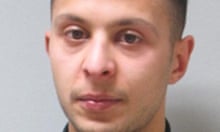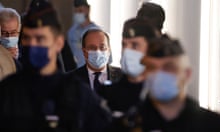Friday 9:35pm
As Jérôme Boucer watched the Californian rock band the Eagles of Death Metal thrash their guitars at the sellout Paris gig, he and his group of friends who had come from Brittany were enjoying what had started as “a great show”.
The young crowd who had been dancing in the pit in front of the stage for half an hour amid 1,500 other concertgoers had no way of knowing about the disturbing events that had just started to unfold across the French capital. Two explosions had just gone off outside the Stade de France football stadium north of Paris, detonated by suicide bombers. Closer by, gunmen had driven up to restaurant terraces and begun to open fire with Kalashnikovs. Another man in a suicide vest had walked into a bar on Boulevard Voltaire in the east of the city, then blown himself up, injuring a waitress.
Inside the Bataclan, where Boucer stood tapping his feet wearing a white shirt that would later be splattered with blood, no one imagined they were about to be targeted in the most deadly of that night’s coordinated terrorist attacks. It would turn into a two-and-a-half-hour massacre that would leave 89 dead and dozens more injured before the gunmen blew up themselves up by activating their suicide belts after a police assault.
About 9:40pm
A rented, black Volkswagen Polo with Belgian licence plates had been waiting for some time 300 metres away from the Bataclan with at least three men inside. One witness at a nearby restaurant said the car had pulled up at 7:45pm but the driver had difficulty parking. “He parked badly, he had to try again about six or seven times,” the witness told Europe 1, describing how he’d got up and gone over to tell them they weren’t parked correctly in their tiny spot. He was met with an icy stare and they didn’t open the window. “They were wearing jackets, [it looked as if] they were obese. They were having difficulty turning the wheel,” he said. “They had a lost look to them, as if they were drugged. They were like the living dead.”
In the car was Samy Amimour, 28, a former bus driver from Drancy, outside Paris, and Omar Ismaïl Mostefai, 29, who had grown up in Courcouronnes south of the capital and had a record for petty crime before moving to the cathedral city of Chartres. Amimour had gone to Syria in 2014 where his father followed him to try to convince him to come back but failed, publicly telling his story to Le Monde as a heartbroken parent who couldn’t prise his son back from jihad. Despite an international arrest warrant being out for Amimour he had succeeded in returning to France below the radar. Mostefai was on a police file for radicalisation and had reportedly been in Syria. With them was at least one other gunman who has not yet been identified.
The witness saw the car there for over an hour before he left the restaurant at about 9:30pm. At one point a police patrol car drove past but didn’t notice anything suspicious. When he heard the news of the Stade de France suicide bombing, the witness immediately tried to call the police “about 80 times” but he was told by the operator they would call him back in an hour. He said they never did.
9:42pm
From the car, one of the three men, dressed in black but with their faces uncovered, sent a text message to an unknown contact saying: “We’ve left, we’re starting”. The phone was later found in a bin outside the concert venue with a floorplan of the Bataclan concert hall in its memory. The phone data later led police to a cheap hotel room in a grey, nondescript hotel block in Alfortville, south of Paris, where the men had booked a room for that week. In the room, there was reportedly a pizza box, chocolate madeleine cakes, syringes and medical equipment including tubing. The police would investigate whether the medical supplies were used for bombmaking or drug-taking, reported the newsweekly Le Point .
9:49pm
As the band was playing the song Kiss the Devil with a guitar solo under way, the three gunmen got out of their car carrying Kalashnikovs and walked to the door, shot at a doorman and people smoking outside the venue, before bursting into the concert hall and opening fire on the crowd. They stood still, paused and shot into the audience in a sustained volley, the state prosecutor said.
According to witnesses, the first to be hit were the people near the bar at the back of the venue. For a few seconds nobody knew what was going on. Jérôme Boucer, who was engrossed in the gig nearer the stage, assumed the “pop, pop, pop” sound was part of the show – a firecracker perhaps. Other concertgoers wondered if it was special effects, a speaker blowing, or even noise from a birthday party in the bar next door. Seconds later, when the band instantly stopped playing and ran off stage, the audience knew it was an attack.
From 9:50pm
For a few minutes the concert hall was plunged into darkness, with only the fire from the machine guns flashing as the gunmen kept shooting. Quickly the lights went on and different witnesses described the clear ripple effect of the crowd – “like a gust of wind through wheat” – as people were mown down by gunfire and rows of people dropped to the ground.
Witnesses described how their faces were splattered in blood as people beside them were shot in the head and fell. The shooting continued for 10 minutes before the men reloaded and began shooting again, aiming at the head and thorax with professionalism. “It was carnage,” said Marc Coupris, 57, a legal worker. “It looked like a battlefield. There was blood everywhere, there were bodies everywhere.”
Many dropped to the ground and lay there among the blood still running hot from victims. “I made eye contact with a man. He was no longer blinking and he fell,” Louise, 27, told Libération. “In a domino effect, everyone got down, one on top of the other.” A 29-year-old woman described blood and flesh that had been blown on to others. “I had it in my mouth, my eyes. But I didn’t move.”
The firing was relentless and indiscriminate, witnesses said. A military doctor who treated the wounded would later describe it to Le Monde as like being in a war zone “without a bullet-proof vest”. The gunmen fired up into the balconies and dead bodies fell over and down on to the stalls below. One woman who screamed that her boyfriend was dead was instantly shot.
“They were just stood firing at random into the crowd. It was terrifying. There was lots of screaming, lots of panic, lots of blood. People threw themselves to the ground but then they then just started firing at random at the people on the ground. That was when I thought we had to get out,” said Frédéric Nowak, who had driven to the gig from outside Paris with his brother-in-law and son.
From 10pm
The gunmen shouted that they were there because of Syria and Iraq and particularly François Hollande’s airstrikes on Syria. They said they would “make you understand” what women and children were suffering in those air raids.
While the gunmen recharged their Kalashnikovs, those who thought they stood a chance of making it out ran towards an exit or escape route. The band was among those who had fled swiftly out of a side exit behind the stage as soon as the shooting started. Another group of people, believed to be with the band’s bassist, ran towards a side-door that needed a keypad code to open. One of the venue’s bouncers, many of whom were trying to open exits, opened it and the crowd stayed hidden inside a small room for an hour and a half. The band’s merchandising manager, who was not with them, was killed.
Simon, 32, a cameraman told L’Express how, terrified and in shock, he had run down the street, hailed a taxi, got in, thrown notes at the driver and shouted at him to drive as there was a gun attack. “He thought I was mad,” he said.
Frédéric Nowak, with his stomach caked in blood from surface wounds, was one of at least 70 people who edged their way behind speakers and around the stage before running up a flight of stairs and forcing a trapdoor on to the roof. They were taken in by people from neighbouring buildings who pulled them to their flats. He was separated from his 21-year-old son, who was led to another flat.
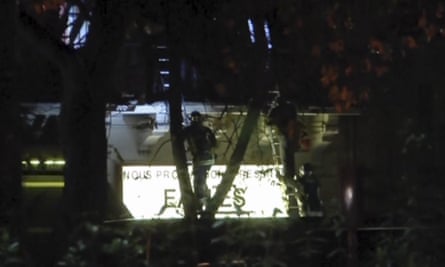
Some people barricaded themselves into dressing rooms, where they packed in tightly, pushing a fridge, an armchair and a table up against the door. Others tried to run to dressing rooms but found themselves in the toilets – a dead-end – so smashed open the false ceiling, climbed in and hid above the ceiling amid metal rafters, waiting for 45 minutes, hearing shots and unsure whether the gunmen would come for them. One described it as like hiding in a “rat hole”.
In the surrounding streets, the injured and other survivors began fleeing, blood-soaked, dragging themselves or the wounded, some finding shelters in bars. Many said they had to walk over dead bodies or trample on each other in the scramble to get out. Others ran ashen-faced as fast as they could from nearby bars. A musician in one cafe said you could hear “screaming, screaming, screaming. I heard people moaning, howling.”
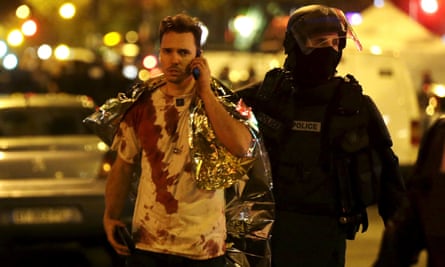
Two of the gunmen went upstairs to the balcony while one stayed downstairs firing at people who attempted to leave.
As many tried to flee from one side-exit to an alleyway, captured on film by a Le Monde journalist who lived nearby, they were being shot at from behind at close range as they ran. Several witnesses described bodies falling beside them as they ran towards that exit. On the film, a pregnant woman dangles from a window ledge by her fingertips, pleading “I’m pregnant, I’m slipping,” before she is rescued by a man. That man, Sebastien, from the south of France, had stopped to pull her back in the window while he was looking for an escape route. Shortly afterwards he would be one of the concertgoers taken hostage by the two gunmen upstairs.
From 10:10pm
Those who couldn’t flee felt they had no choice but to lie still and play dead among the bodies. But many witnesses described how the gunmen changed pace, and began looking for survivors to pick out and shoot while they lay on the floor. Some said they walked around kicking people on the ground to see if they moved, and then shot them.

Writer Nicolas Stanzick, who was there with his wife and lay totally still for an hour-and-a-half under a barrier near the lighting box, told Paris Match how he was surrounded by the dead and injured but couldn’t go to their aid. He described the room as “an immense hall of agony”, with people moaning everywhere. “Terror dehumanised us, it was horrible.” He was scared he would vomit from all the blood flowing from wounds and the gunmen would notice him and shoot.
10:15pm
Within 10 minutes of the first shooting, armed police had begun to mass outside and lock down the area. The first officer entered the building and came across one attacker downstairs, reportedly on the stage pointing his gun. The police officer shot at him, the gunman’s suicide belt detonated and he was killed. The officer had to edge back out waiting for back-up.
After 10:15pm
From this point, the two gunmen upstairs took about 20 hostages. One unnamed hostage told France 2 TV that they made them stand at different points and look down into the concert hall and tell them what they saw. One hostage who was asked what he could see said there were people moaning and begging for help. “That more or less made them laugh,” the witness said. Some hostages were made to stand at the window and alert them if they saw police or a sniper, threatened with being “shot in the head or thrown out the window” if they didn’t comply.
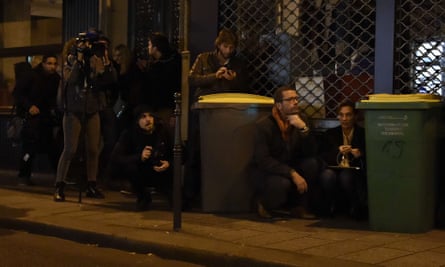
In order to prove that he was “with” the gunmen, Sebastien was handed a wad of cash and told to burn it “to see if money was important in my eyes”. He did. Another hostage said they felt if they said one wrong word they would be killed.
From 11:30pm
Elite police squads entered the building to secure and evacuate survivors from downstairs.
“We discovered a hell on earth,” a man called Jeremy, the commando captain, who spoke to NBC. “Nobody was screaming. First thing we saw was the guy shooting.”
A unit moved upstairs to where the gunmen were holed up in a room at the end of a corridor that was one metre wide. Behind the door, they put 20 hostages in front of them as a human shield.
“(There were) maybe 20 hostages. We cannot shoot at that time it was too risky for the hostages,” Jeremy added.
The gunmen shouted out to police the number of a hostage’s phone, which police initially struggled to take down. Over the next 50 minutes there were four phone exchanges with a police negotiator. The gunmen asked for the police to leave and continued to talk about Syria. It became clear negotiation was not possible.
“They want just to prepare themselves for the final assault. They don’t want to negotiate anything,” said Jeremy
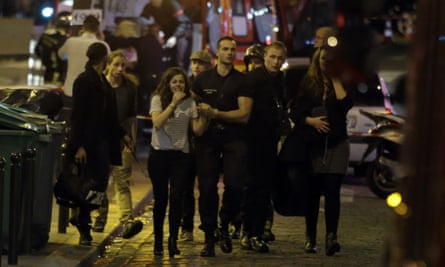
00:20am
The order was given for a police assault. It lasted three minutes. Police, behind shields, burst open the door and the gunmen opened fire at them, threw in grenades and while the gun exchange continued, managed to pull the hostages one-by-one behind their shields.
“It was a dead end for them,” said Jeremy. “The first one blew himself with the explosive jacket. The second one tried to do the same but he got shot by the two officers. There was blood everywhere.”
From 00:30am
The police squads then came in to look for survivors. “It was a terrible vision, a carpet of human bodies,” one officer told France Bleu radio. “There was a deafening silence, you just heard the sound of mobile phones.” The officer saw a survivor at the back of the hall and asked him to raise his hands. “And then, from this carpet of bodies, all the survivors raised their hands and we realised there were still many.”
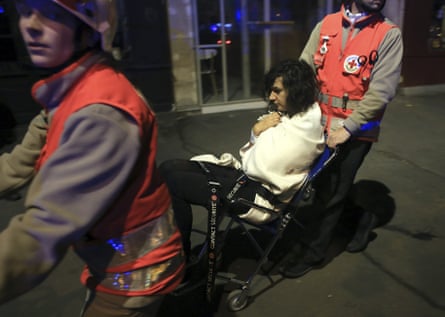
Slowly, people were rescued from hiding places across the building. Hospitals across the city were mobilised to deal with what one medic called “war wounds from war weapons”.
Slowly over the coming day the 89 dead began to be identified — students, teachers, a tax inspector, a geographer, record-label staff, an NGO volunteer, a journalist, a lawyer, mothers, fathers, wives and husbands. Mostly young people – the Bataclan generation.
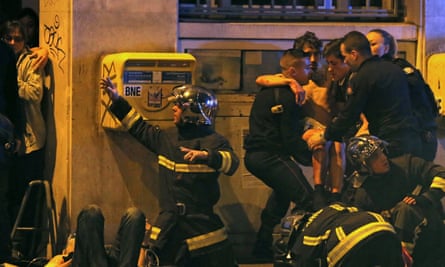
It was not until later in the weekend that notes and flowers began to be laid nearby for the dead. One note read: “Wherever you are I hope the music is good.”








